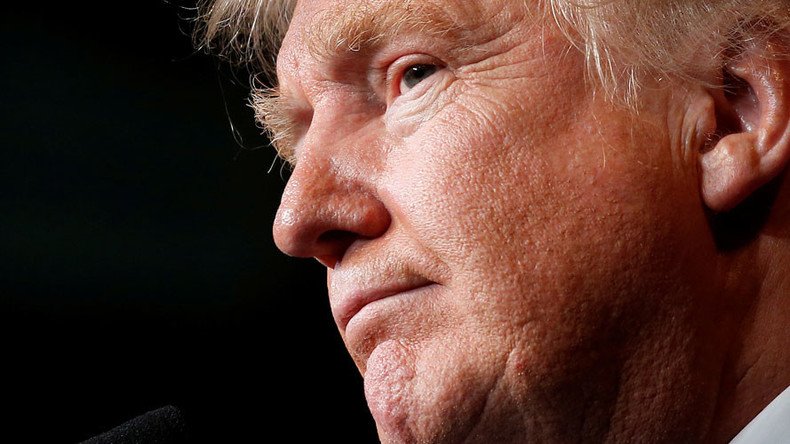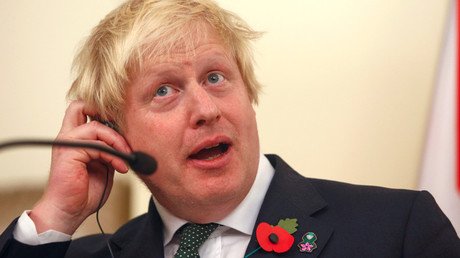If Trump serenades Putin, what about the Brits?

If there is a diplomatic rapprochement between the US and Russia after Donald Trump's election, where will that leave Britain, and the Russophobic forces in the UK?
Will they do a U-turn to follow the new White House line or try to get the President-elect to carry on with Cold War 2.0?
The Sunday Telegraph believes it’ll be the latter. The newspaper reported last weekend that Britain is facing a "diplomatic crisis" over "Trump’s plans to forge an alliance with Vladimir Putin and bolster the Syrian regime," and that was before Monday’s telephone conversation between the two men, which led to Russophobes in the West having a collective nervous breakdown.
The Telegraph noted that UK Foreign Secretary Boris Johnson has accused Russia of committing war crimes, and said Britain "will use the next three months before Mr. Trump enters the White House to try to convince him of the importance of removing President Assad."
On foreign policy UK's neocon govt is more extreme than #DonaldTrump. Where are the protests? https://t.co/fYg07eWASB via @telegraphnews
— Neil Clark (@NeilClark66) November 13, 2016
Got that? The British government, stuck in a 2012 time-warp, is still screeching "Assad must go" at a time when the US President-in-waiting has said that defeating ISIS should be a bigger priority than toppling the leader of a secular government which is fighting ISIS.
We find ourselves in late 2016, in a position where genuine anti-imperialists in the UK find themselves more in tune on foreign policy with the US President-elect than the UK government. At the same time, we’ve got traditional cheerleaders for US imperialism now slamming the US, and hailing the UK, France, and Germany, as defenders of the ‘free world’ and ‘the West’.
We’ve also got the 'diplomats' who, instead of supporting diplomacy are outraged when a US President-elect wants dialogue and cooperation with Russia instead of outright hostility. Orwellian? I’m sure old George is spinning in his Sutton Courtenay grave.
Whatever we think of his stances on other issues, Donald Trump's line on Syria, and his support for working with Russia against a group that’s planned/inspired attacks on civilians in Western cities, and on the holiday beaches of the Mediterranean, is surely more sensible than the position taken by what Peter Hill, the former editor of the Daily Express, has called"snide Westminster snobs."
Trump knows ISIS can only be defeated in Syria if the big powers work together, and that toppling Assad would only play into the hands of the Islamic State (IS, formerly ISIS/ISIL) and Al-Qaeda affiliates.
Of course, it's far from a done deal that US policy on Russia and Syria will soften from January onwards. What politicians say during election campaigns, and what they actually do when elected, are often two very different things. Remember all those wonderful promises made by Barack Obama? And don’t forget, at the time of his election, George W. Bush was hailed as the President who "wouldn’t meddle."
But even if 'The Donald' is genuinely committed to building a new, more constructive ‘special relationship’ with Russia and changing his country’s policy on Syria, and let’s give him the benefit of the doubt on this, there are still plenty of obstacles in his way.
McCain to Trump: Don't You Dare Make Peace with Russia! https://t.co/yhWouUIqfA#tlot#ronpaulpic.twitter.com/KOFAVMRNBP
— Ron Paul News (@RonPaulNews) November 16, 2016
Anti-Russian hardliners abound in Congress. That wild-eyed serial warmonger John McCain - chair of the Senate Armed Services Committee - has already warned Trump about another ‘reset’ in the relationship with Russia, and declared a thaw in US-Russian relations would be unacceptable.
Trump doesn’t get on with 'Bomber' McCain (surely a point in his favor), but worryingly both reported front-runners for Secretary of State, John Bolton and Rudy Giuliani, can also accurately be described as hawks, and men who, if appointed to the job, could make us nostalgic for John Kerry. In 2013, Bolton, slamming Barack Obama as Putin’s ‘buddy’, said: “I think in order to focus Putin’s thinking, we need to do things that cause him pain as well."
While earlier this week, Giuliani said the US should threaten Russia with military force.
Then there’s the various arms/defense industry lobby groups, and the ‘think tanks’ they bankroll, who most certainly don’t want to see the US and Russia becoming pals. What would happen to our profits and our cushy jobs if there were no Russian ‘threat’ for us to peddle!
But while we must be very careful of making assumptions about what a Trump Presidency will lead to, facts on the ground in Syria mean that the US will probably have to start showing Russia a little more respect anyway.
Here’s the rub: after almost six years of war, the secular government in Damascus is not only still in place, but regaining territory. Syria has proved to be the Stalingrad of the US Empire. To turn defeat into victory for the serial regime changers at this stage would mean a huge military effort and the very real risk of war with Russia.
Of course, neocon fanatics penning angry opeds in overheated newspaper offices in London and New York are quite happy to risk a ‘limited war’ and even a ‘limited nuclear war’ with Russia, but the US military top brass are no fools and know the score.
Like all other imperial powers in history the US only launches wars when it’s convinced that it’ll record a relatively easy victory, and not when it knows its opponents are strong, and can inflict serious retaliatory damage.
The Federal Republic of Yugoslavia had a large and well-trained army in 1999, but was surrounded by NATO, or NATO-friendly countries, and lacked international allies who could give it meaningful help. Iraq in 2003 was a country that had been severely weakened through sanctions and whose air defenses had been ‘ground down’ by repeated attacks.
The US and its allies launched ‘Shock and Awe’ and a full-scale invasion not because they believed Saddam had WMDs, but because they knew damn well that he didn’t. Libya’s Muammar Gaddafi unwisely gave up his WMDs, in return for a lifting of sanctions, but the move only sowed the seeds of his and his country’s destruction. Again, in 2011, Libya was seen as militarily weak and so the US and its NATO partners launched their attack. Syria though is different. The country has a strong army and air force and modern air defenses, which have been improved further in the past year. And it has powerful allies: Russia, Iran, Hezbollah.
Public opinion certainly played its part in helping to prevent full-scale military assault against the Syrian government in 2013, but as Dan Glazebrook wrote in the Asia Times, the US military had cold feet about the operation. The Washington Post quoted an anonymous US army officer as saying: "I can’t believe the President is even considering it. Syria has modern weaponry. We would have to retrain for a modern war."
Short of risking World War III (and remember Russia has warned that it could shoot down coalition jets if they attacked Syrian forces), it’s game over for the neocons’ bloodstained regime change op in Syria. The only way the US can achieve anything in Syria now is to work with the Kremlin. Wiser heads in Washington probably realize this and Trump may well be ahead of the game.
If a new "strong and enduring relationship" between the US and Russia does emerge, as Trump has called for, it’ll be fun seeing the reaction of the Russia-bashers in Britain, and in particular watching Foreign Secretary Boris Johnson perform another political somersault.
Back in December, when he was still a columnist for the Daily Telegraph, Johnson called, very sensibly, for the UK and its allies to work with Russia and the Syrian government against ISIS. But as soon as he was appointed Foreign Secretary in the summer, Boris changed his tune.
It was now a case of ’Assad must go!’ and urging people to protest outside the Russian Embassy.
If Trump keeps his promises and resets relations with Moscow- then 'BoJo' will have to do yet another flip-flop if he‘s to retain his King Charles Street gig.
And he won’t be the only one.
Follow Neil Clark @NeilClark66
The statements, views and opinions expressed in this column are solely those of the author and do not necessarily represent those of RT.














